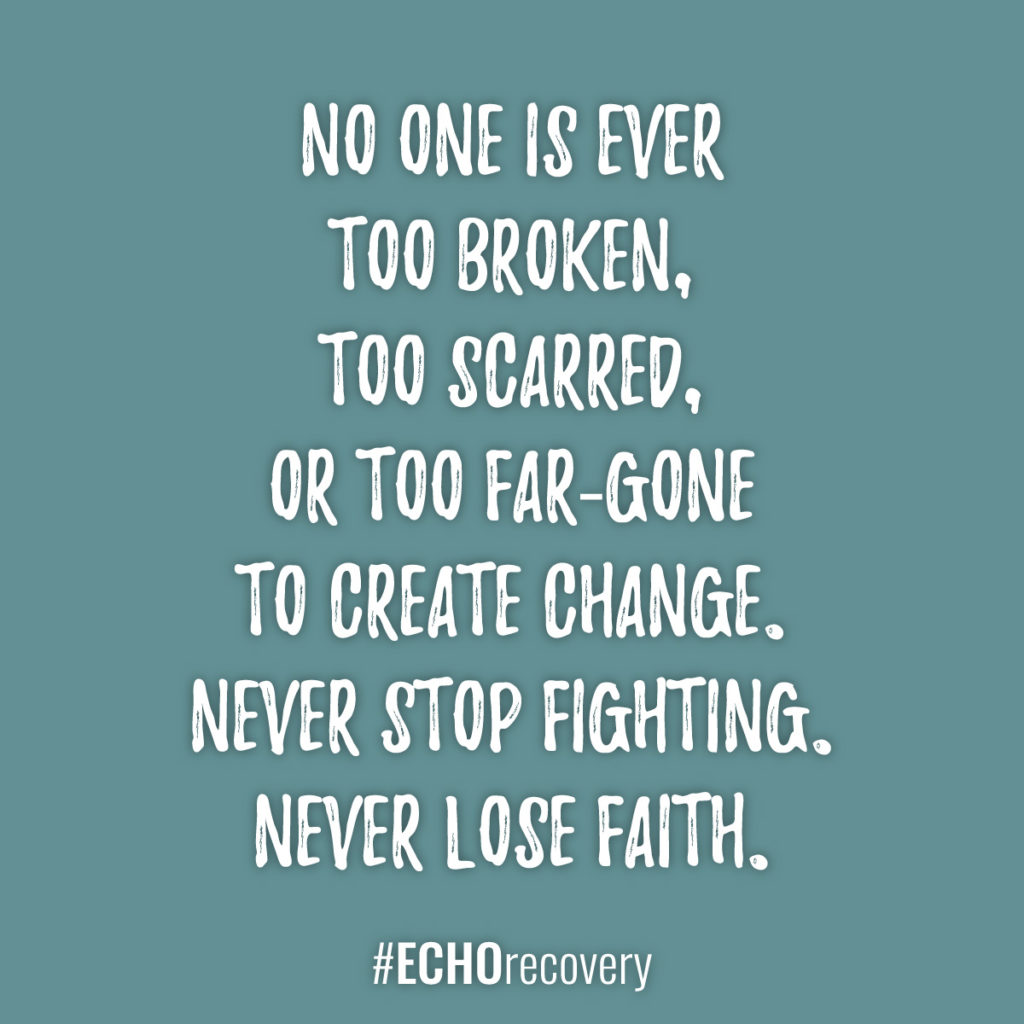In 2014 veteran addiction treatment executive Jim Haggerty spearheaded the effort to form the nonprofit ECHO Recovery, and after much time and effort, we are thrilled to present this brand new website to the public.
With the advent of this blog as part of the new site, our goal is to cover such topics as:
- Rehab Industry Advancements
- Best Treatment Practices
- Breakdown of the Different Levels of Care for Addiction
- Recovery and Relapse-Prevention Tips and Strategies
- Sober Living News and Advocacy
- Drug Use Stats and News (especially regarding the opioid epidemic)
What Does ECHO Mean?
The “ECHO” in ECHO Foundation stands for East Coast Housing Opportunities. In short, our goal is to help people going through rehab find safe and reliable sober homes while actively enrolled in a treatment program – especially outpatient and aftercare. Online donations play a major role in allowing us to help these individuals locate and finance their sober living accommodations.
ECHO Recovery is getting our start by offering our services in The Old Line State of Maryland. We have plans to quickly expand our sober living offerings throughout the East Coast (hence our name), especially to New Hampshire, Rhode Island, Massachusetts and New York – states hard hit by the opioid epidemic.
According to Haggerty, there are not enough long-term sober living options available on the East Coast for individuals who have graduated residential addiction rehab programs. So, ECHO Recovery is prepared to help solve that problem.
Ultimately, we aim to expand services nationwide to help as many people as possible become and stay sober.
Why the Focus on Outpatient Addiction Treatment?
Outpatient addiction treatment is the critical step between graduating a residential program and returning to so-called “normal life.” Studies show that the longer someone is in treatment for addiction, the better his or her chance for long-term recovery. Since many residential programs are only 30 days, most aren’t getting the breadth of care they truly need to be able to go forward in life substance-free.

Partial hospitalization and outpatient programs help fill the void, but many clients are in need of a stable place to stay as they continue receiving outpatient services. Sober homes encourage accountability in each client’s sobriety and remove the temptation of substance use. They also provide a solid base for the client to return to after attending outpatient sessions. Clients are even encouraged to work part-time or continue their formal education.
If you need a refresher on the services commonly offered in outpatient rehab services, they include (but are not limited to):
- Individual Therapy
- Group Therapy
- Family Therapy
- Faith-Based Support Groups (such as 12-Step Meetings)
- Nutrition Counseling
- Relapse Prevention Education
- Life Skills Counseling
- Alumni Events
- Holistic Therapies (such as Yoga, Massage, etc.)
Offering Much More than Sober Housing
Providing sober living opportunities is just a portion of what we do at ECHO Recovery. Our overall mission is three-pronged:
- Advocacy – We want to advocate on local and national levels for expanded and easier access to addiction treatment services for those who need the help.
- Education – We want to educate individuals and the public on what addiction is and how treatment can make the difference. This will have the ancillary benefit of helping end the stigma surrounding addiction.
- Support – We pledge our unwavering support to individuals and families who need to cease the destructive cycle of drug and alcohol abuse. This is where sober housing comes into play.
Stay Tuned for Much More
The best is yet to come from ECHO Recovery. We invite you to follow us on our journey as our site continues to grow as we expand our reach throughout the East Coast and on to the rest of the country. There’s an opioid epidemic that needs to come to an end, as does the stigma surround drug and alcohol addiction. There’s much work to be done.
Jenny Weatherall is the co-owner and CEO of Eminent SEO, a design and marketing agency founded in 2009. She has worked in the industry since 2005, when she fell in love with digital marketing… and her now husband and partner, Chris. Together they have 6 children and 3 granddaughters.
Jenny has a passion for learning and sharing what she learns. She has researched, written and published hundreds of articles on a wide variety of topics, including: SEO, design, marketing, ethics, business management, sustainability, inclusion, behavioral health, wellness and work-life balance.


